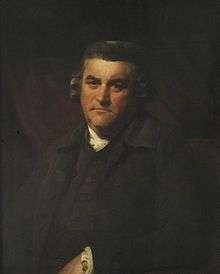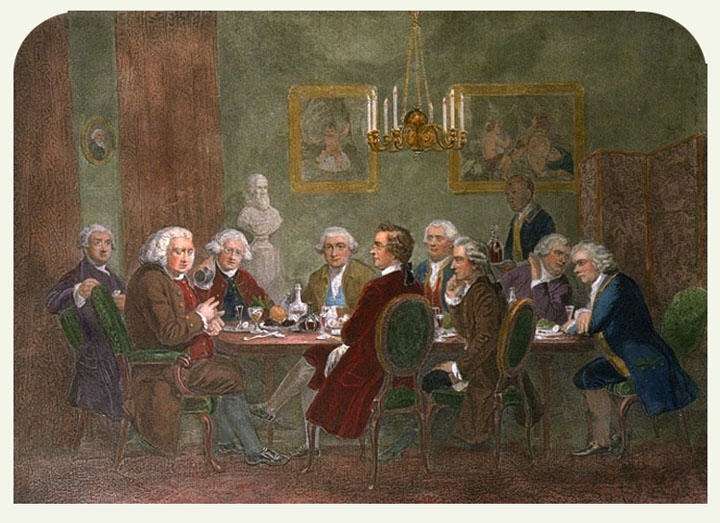Thomas Warton
Thomas Warton (9 January 1728 – 21 May 1790) was an English literary historian, critic, and poet. He was appointed Poet Laureate in 1785, following the death of William Whitehead (poet). He is sometimes called Thomas Warton the younger to distinguish him from his father Thomas Warton the elder. His most famous poem remains The Pleasures of Melancholy, a representative work of the Graveyard poets.
Thomas Warton | |
|---|---|
 | |
| Poet Laureate of the United Kingdom | |
| In office 20 April 1785 – 21 May 1790 | |
| Monarch | George III |
| Preceded by | William Whitehead |
| Succeeded by | Henry James Pye |
| Personal details | |
| Born | 9 January 1728 Basingstoke, Hampshire, England |
| Died | 21 May 1790 (aged 62) Oxford, England |
| Nationality | English |
| Alma mater | Trinity College, Oxford |
| Occupation | Literary historian, critic, and poet |
Life
Warton was born in Basingstoke, Hampshire, the son of poet Thomas Warton, the Elder, and younger brother of Joseph Warton. As a youngster, Warton demonstrated a strong predilection toward writing poetry, a skill he would continue to develop all of his life.[1] In fact, Warton translated one of Martial's epigrams at nine, and wrote The Pleasures of Melancholy at seventeen.
His early education was given to him by his father. At sixteen years of age he enrolled at Winchester College, later moving to Trinity College, Oxford. He graduated from Oxford in 1747, where he subsequently became a Fellow. Warton was selected as Poet Laureate of Oxford in 1747 and again in 1748. His duty in this post was to write a poem about a selected patroness of the University, which would be read to her on a specially appointed day.[1]

- ^ 'A literary party at Sir Joshua Reynolds's, D. George Thompson, published by Owen Bailey, after James William Edmund Doyle, published 1 October 1851
Warton was appointed Professor of Poetry at the university in 1757, a post that he held for ten years.[2]
In 1771 he was appointed rector of Kiddington in Oxfordshire, a post he held until his death.
In 1785, he was appointed Camden Professor of History, as well as Poet Laureate. He was a friend and rival of Samuel Johnson, and his poetry was greatly influenced by earlier English poets such as Chaucer, Drayton, Fairfax, and Spenser.
Among other important contributions, Warton, along with his brother, was among the first to argue that Sir Thopas, by Geoffrey Chaucer, was a parody. Warton contributed to the general project of the ballad revival. He was a general supporter of the poetry of Thomas Gray—a fact that Johnson satirized in his parody "Hermit hoar, in solemn cell." Among his minor works were an edition of Theocritus, a selection of Latin and Greek inscriptions, the humorous Oxford Companion to the Guide and Guide to the Companion (1762); lives of Sir Thomas Pope and Ralph Bathurst; and an Inquiry into the Authenticity of the Poems attributed to Thomas Rowley (1782).
Poetry, criticism and historical works
In 1749, Warton penned The Triumph of Isis, a poem in praise of Oxford and the many students who had received their education there. Published anonymously, The Triumph of Isis rebutted William Mason's Isis, an Elegy published the previous year, which was anything but flattering to Oxford.[1]
Following the success of The Triumph of Isis, Warton wrote Newmarket, a Satire, which was followed by a collection of verses. His complete poetical works were included in an anthology that has been reissued.[3]
Warton's first major academic work was Observations on the Faerie Queene of Spenser, published in 1754. He is, however, best known for the three-volume The History of English Poetry (1774–81), which covered the poetry of the 11th through the 16th centuries. Although the work was criticized for its many inaccuracies, it is nonetheless considered a highly important and influential historical tome.
In 1782 he wrote The History and Antiquities of Kiddington, an early example of English local history.[4]
As a poet, Warton was more inclined toward light and humorous verse, odes and sonnets. His sonnets helped to revive the form, which had fallen out of fashion. He was interested in primitivism, which was an important stage toward romanticism.
A sonnet by Warton
| |
|
Ah! what a weary race my feet have run |
[5] |
Various works
- The Pleasures of Melancholy.
- Observations on the Faerie Queene of Spenser. 1754.
- The Oxford Sausage. 1764. – an anthology of verse and Oxford wit
- Inquiry into the Authenticity of the Rowley Poems. 1770.
- History of English Poetry. 1774–81.
- The History and Antiquities of Kiddington. 1782.
Notes
a. ^ The River Lodon referred to by Warton is the stream running through the Parsonage House of his childhood, in Basingstoke.[6] The Loddon rises west of Basingstoke and is fed by springs in the town; it joins the Kennet at Reading.
References
- Life of Thomas Warton, the Younger Archived 14 March 2006 at the Wayback Machine
- "He was ordained and eventually served as professor of poetry at Oxford from 1757 to 1767." Warton, Thomas, 1728–90, English poet and literary historian
- General Books LLC Archived 18 July 2011 at the Wayback Machine ISBN 1-154-89122-4, reissue of The Poetical Works of Thomas Gray, Thomas Parnell, William Collins, Matthew Green, and Thomas Warton, Routledge, 1853, London by Robert Aris Willmott.
- Warton, T. The History and Antiquities of Kiddington. 3rd edition (1815) in Google Books
- Chambers' Book of Days 21 May
- Gilfillan, Rev. George (1854). The Poetical Works of Goldsmith, Collins and T. Warton. Edinburgh: James Nichol.
External links
| Wikisource has original works written by or about: Thomas Warton |
| Wikiquote has quotations related to: Thomas Warton |
- Thomas Warton at the Eighteenth-Century Poetry Archive (ECPA)
- Works by Thomas Warton at Project Gutenberg
- Works by or about Thomas Warton at Internet Archive
- Works by Thomas Warton at LibriVox (public domain audiobooks)

| Court offices | ||
|---|---|---|
| Preceded by William Whitehead |
British Poet Laureate 1785–1790 |
Succeeded by Henry James Pye |